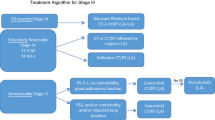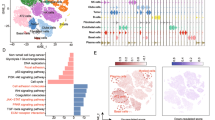Abstract
Introduction
Mutated tumor suppressor genes (TSG) such as TP53, STK11, and MGA are widely-reported. We hypothesized the presence of single mutation or co-occurring mutations in these specific genes may represent a significant therapeutic target for lung adenocarcinoma.
Methods
We sequenced lung adenocarcinoma samples from 677 East-Asian patients, combined them with those from cBioPortal public database (including TCGA) and performed a comparative analysis between Asian and Caucasian populations.
Results
East-Asian lung adenocarcinomas presented distinct driver-mutational distribution compared to that of Caucasians (79% vs 56%, p < 0.001). Similar results were observed in TSG mutations of TP53 (35% vs 46%, p = 0.150), STK11 (4% vs 17%, p = 0.006) and MGA (10% vs 4%, p = 0.166). Compared with none-mutational cases, the patients harboring TSG mutations are more likely to be male (p = 0.009), smokers (p < 0.001), and more advanced disease (p = 0.004). In addition, the TSG-mutated tumors had poorer differentiation (p < 0.001), and more likely to be solid or micropapillary-predominant adenocarcinomas (p < 0.001). Survival analysis showed that both overall survival (OS, p < 0.001) and post-recurrence survival (PRS, p < 0.001) became worse with the accumulation of TSG mutations. However, the prognostic variety was not found in Caucasian patients. Moreover, multivariate analysis proved the accumulation of TSG mutations independently predicts both unfavorable OS (HR = 0.435, 95% CI 0.245–0.774, p = 0.005) and PRS (HR = 0.491, 95% CI 0.269–0.894, p = 0.020) in East-Asian patients, adjusting all other survival-associated factors.
Conclusions
Co-occurring mutations of specific TSGs define unfavorable subgroups of lung adenocarcinoma, implying that the tumor promotion mechanisms contribute to the heterogeneity in tumor evolution. However, the Caucasian population did not show the same results, providing insights into the molecular basis underlying the striking racial disparities of this disease and evidence for different gene-panel designs for different population in the purpose of targeted therapy.



Similar content being viewed by others
References
Bergethon K, Shaw AT, Ou SH et al (2012) ROS1 rearrangements define a unique molecular class of lung cancers. J Clin Oncol 30:863–870
Campbell JD, Alexandrov A, Kim J et al (2016) Distinct patterns of somatic genome alterations in lung adenocarcinomas and squamous cell carcinomas. Nat Genet 48:607–616
Cancer Genome Atlas Research N (2012) Comprehensive genomic characterization of squamous cell lung cancers. Nature 489:519–525
Cancer Genome Atlas Research N (2014) Comprehensive molecular profiling of lung adenocarcinoma. Nature 511:543–550
Dang CV (2012) MYC on the path to cancer. Cell 149:22–35
Ding L, Getz G, Wheeler DA et al (2008) Somatic mutations affect key pathways in lung adenocarcinoma. Nature 455:1069–1075
Drilon A, Wang L, Hasanovic A et al (2013) Response to Cabozantinib in patients with RET fusion-positive lung adenocarcinomas. Cancer Discov 3:630–635
Facchinetti F, Bluthgen MV, Tergemina-Clain G et al (2017) LKB1/STK11 mutations in non-small cell lung cancer patients: descriptive analysis and prognostic value. Lung Cancer 112:62–68
Gao Y, Xiao Q, Ma H et al (2010) LKB1 inhibits lung cancer progression through lysyl oxidase and extracellular matrix remodeling. Proc Natl Acad Sci USA 107:18892–18897
Gao Y, Ge G, Ji H (2011) LKB1 in lung cancerigenesis: a serine/threonine kinase as tumor suppressor. Protein Cell 2:99–107
Gibbons DL, Byers LA, Kurie JM (2014) Smoking, p53 mutation, and lung cancer. Mol Cancer Res 12:3–13
Hurlin PJ, Steingrimsson E, Copeland NG et al (1999) Mga, a dual-specificity transcription factor that interacts with Max and contains a T-domain DNA-binding motif. EMBO J 18:7019–7028
Imielinski M, Berger AH, Hammerman PS et al (2012) Mapping the hallmarks of lung adenocarcinoma with massively parallel sequencing. Cell 150:1107–1120
Ji H, Ramsey MR, Hayes DN et al (2007) LKB1 modulates lung cancer differentiation and metastasis. Nature 448:807–810
Jiang L, Gu ZH, Yan ZX et al (2015) Exome sequencing identifies somatic mutations of DDX3X in natural killer/T-cell lymphoma. Nat Genet 47:1061–1066
Jo YS, Kim MS, Yoo NJ et al (2016) Somatic mutation of a candidate tumour suppressor MGA gene and its mutational heterogeneity in colorectal cancers. Pathology 48:525–527
Kawaguchi T, Koh Y, Ando M et al (2016) Prospective analysis of oncogenic driver mutations and environmental factors: Japan Molecular Epidemiology for Lung Cancer Study. J Clin Oncol 34:2247–2257
Kleppe M, Levine RL (2014) Tumor heterogeneity confounds and illuminates: assessing the implications. Nat Med 20:342–344
Kwak EL, Bang YJ, Camidge DR et al (2010) Anaplastic lymphoma kinase inhibition in non-small-cell lung cancer. N Engl J Med 363:1693–1703
Matsumoto S, Iwakawa R, Takahashi K et al (2007) Prevalence and specificity of LKB1 genetic alterations in lung cancers. Oncogene 26:5911–5918
Mitsudomi T, Morita S, Yatabe Y et al (2010) Gefitinib versus cisplatin plus docetaxel in patients with non-small-cell lung cancer harbouring mutations of the epidermal growth factor receptor (WJTOG3405): an open label, randomised phase 3 trial. Lancet Oncol 11:121–128
O’Neill GM, Seo S, Serebriiskii IG et al (2007) A new central scaffold for metastasis: parsing HEF1/Cas-L/NEDD9. Cancer Res 67:8975–8979
Pan Y, Wang R, Ye T et al (2014a) Comprehensive analysis of oncogenic mutations in lung squamous cell carcinoma with minor glandular component. Chest 145:473–479
Pan Y, Zhang Y, Li Y et al (2014b) ALK, ROS1 and RET fusions in 1139 lung adenocarcinomas: a comprehensive study of common and fusion pattern-specific clinicopathologic, histologic and cytologic features. Lung Cancer 84:121–126
Rizvi NA, Hellmann MD, Snyder A et al (2015) Cancer immunology. Mutational landscape determines sensitivity to PD-1 blockade in non-small cell lung cancer. Science 348:124–128
Romero OA, Torres-Diz M, Pros E et al (2014) MAX inactivation in small cell lung cancer disrupts MYC-SWI/SNF programs and is synthetic lethal with BRG1. Cancer Discov 4:292–303
Rosell R, Carcereny E, Gervais R et al (2012) Erlotinib versus standard chemotherapy as first-line treatment for European patients with advanced EGFR mutation-positive non-small-cell lung cancer (EURTAC): a multicentre, open-label, randomised phase 3 trial. Lancet Oncol 13:239–246
Sanchez-Cespedes M, Parrella P, Esteller M et al (2002) Inactivation of LKB1/STK11 is a common event in adenocarcinomas of the lung. Cancer Res 62:3659–3662
Schabath MB, Welsh EA, Fulp WJ et al (2016) Differential association of STK11 and TP53 with KRAS mutation-associated gene expression, proliferation and immune surveillance in lung adenocarcinoma. Oncogene 35:3209–3216
Sequist LV, Yang JC, Yamamoto N et al (2013) Phase III study of afatinib or cisplatin plus pemetrexed in patients with metastatic lung adenocarcinoma with EGFR mutations. J Clin Oncol 31:3327–3334
Shackelford DB, Shaw RJ (2009) The LKB1-AMPK pathway: metabolism and growth control in tumour suppression. Nat Rev Cancer 9:563–575
Shah U, Sharpless NE, Hayes DN (2008) LKB1 and lung cancer: more than the usual suspects. Cancer Res 68:3562–3565
Sherr CJ (2004) Principles of tumor suppression. Cell 116:235–246
Siegel RL, Miller KD, Jemal A (2017) Cancer Statistics, 2017. CA Cancer J Clin 67:7–30
Stephens P, Hunter C, Bignell G et al (2004) Lung cancer: intragenic ERBB2 kinase mutations in tumours. Nature 431:525–526
Sun Y, Ren Y, Fang Z et al (2010) Lung adenocarcinoma from East Asian never-smokers is a disease largely defined by targetable oncogenic mutant kinases. J Clin Oncol 28:4616–4620
Travis WD (2015) WHO classification of tumours of the lung, pleura, thymus and heart. International Agency for Research on Cancer. http://apps.who.int/bookorders/anglais/detart1.jsp?codlan=1&codcol=70&codcch=4007
Wang R, Hu H, Pan Y et al (2012a) RET fusions define a unique molecular and clinicopathologic subtype of non-small-cell lung cancer. J Clin Oncol 30:4352–4359
Wang R, Pan Y, Li C et al (2012b) The use of quantitative real-time reverse transcriptase PCR for 5′ and 3′ portions of ALK transcripts to detect ALK rearrangements in lung cancers. Clin Cancer Res 18:4725–4732
Wang R, Wang L, Li Y et al (2014) FGFR1/3 tyrosine kinase fusions define a unique molecular subtype of non-small cell lung cancer. Clin Cancer Res 20:4107–4114
Weir BA, Woo MS, Getz G et al (2007) Characterizing the cancer genome in lung adenocarcinoma. Nature 450:893–898
Funding
This work was supported by Grants 81330056; 81172218; 81572253 from the National Natural Science Foundation of China.
Author information
Authors and Affiliations
Corresponding author
Ethics declarations
Conflict of interest
The authors declare no conflicts of interest.
Ethical approval
All procedures performed in studies involving human participants were in accordance with the ethical standards of the institutional and/or national research committee and with the 1964 Helsinki declaration and its later amendments or comparable ethical standards.
Informed consent
Informed consent was obtained from all individual participants included in the study.
Electronic supplementary material
Below is the link to the electronic supplementary material.
Rights and permissions
About this article
Cite this article
Zhang, Y., Ma, Y., Li, Y. et al. Comparative analysis of co-occurring mutations of specific tumor suppressor genes in lung adenocarcinoma between Asian and Caucasian populations. J Cancer Res Clin Oncol 145, 747–757 (2019). https://doi.org/10.1007/s00432-018-02828-5
Received:
Accepted:
Published:
Issue Date:
DOI: https://doi.org/10.1007/s00432-018-02828-5




